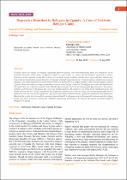Depressive Disorders in Refugees in Uganda; A Case of Nakivale Refugee Camp
Abstract
Globally, there are studies on refugees regarding different aspects. That notwithstanding, there are limitations in the
available literature which makes it difficult to build on such studies as a basis for interventions especially in Africa.
Exposure to the traumatic events like violence, persecution, armed conflicts, murder, mass rape and other threats may
lead to the development of mental disorder. In Uganda, although suspected, there is limited evidence of depression among
refugees. This study intended to examine the prevalence of depression in a refugee sample in the Nakivale refugee camp in
Uganda. Data was collected using a community cross-sectional design. A total of 146 refugees were selected randomly for
the study. Data was collected using the Patient Health Questionnaire and a Socio-Demographic Questionnaire. Descriptive
statistics and Pearson’s Chi-Square test were used in data analysis. All statistics were tested at .05 significant levels. The
results showed that 81% of the respondents had symptoms of depressions. Also the study showed that gender difference in
depression was not statistically significant. Age and marital status had statistically significant correlation with depression.
Based on the results, there is need for screening of mental health in refugees using tools especially custom-made for refugee
group. Also there is need to develop the culturally appropriate interventions to improve the quality of mental health of
refugees in Uganda.
Collections
- Research Articles [54]

